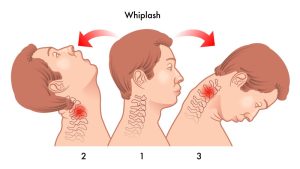
If you’ve ever been knocked around in a way that displaces your head and causes it to whip forward and backwards, but then experienced pain in your neck, shoulders, or head, then you may have contracted what is called whiplash.
Whiplash is a very common injury that results from a rapid and abrupt extension and flexion of the muscles in the neck – like the motion of a whip, hence it’s name. Any event causing this motion can bring about a case of whiplash, such as being in a car that puts on the brakes suddenly without you being able to prepare yourself, being rear-ended, or taking a big fall without properly supporting your neck. Even rollercoasters can give whiplash! The most common causes of whiplash in the US, however, is via a sports injury or a car accident.
How serious is whiplash? Does it need to be treated medically? Find out more in our overview of whiplash!
The Mechanics of Whiplash
 This type of injury is known by terms other than whiplash, such as neck strain or neck sprain, so it might be called by a different name when it comes to articles on the internet or health providers. It also refers to a broader range of injuries rather than just one, like most other injury-related terms do, because when the neck bounces back and forth, the muscles, ligaments and tendons, and/or joints are manipulated past the point of their normal range of motion.
This type of injury is known by terms other than whiplash, such as neck strain or neck sprain, so it might be called by a different name when it comes to articles on the internet or health providers. It also refers to a broader range of injuries rather than just one, like most other injury-related terms do, because when the neck bounces back and forth, the muscles, ligaments and tendons, and/or joints are manipulated past the point of their normal range of motion.
Case-by-case, the severity differs and cause for concern will depend on where the damage extends to, which can include:
- The intervertebral joints
- The cervical discs (also known as intervertebral discs)
- Cervical muscles
- Nerve roots
- Neck ligaments
- Tendons in the neck
Because of this range of potential injuries, symptoms, recovery time, and complications that can potentially develop from a whiplash injury can only be determined by a doctor who can recognize the extent of the whiplash.
When Should I Become Concerned About My Whiplash?
Like many sprains or strains, it might take a few days for the body to catch up with the injury and manifest in pain and loss of mobility, so some symptoms could be delayed. Immediate pain, paresthesia (burning or prickling sensation), or excruciating pain in the neck, shoulders, or back is certainly a cause for concern, as there could be damaged nerves, torn tendons, or injured cervical discs (herniated discs, bulging discs, or pinched nerves) which are severe conditions that result from serious cases of whiplash.
However, whiplash isn’t usually used to describe the more extreme injuries, as they have specified diagnoses and names. In general, the condition is considered a very minor and mild injury with symptoms such as:
- Neck pain
- Neck stiffness
- Injuries to the muscles and ligaments (myofascial injuries)
- Headache
- Dizziness
- Mild shoulder or back pain
In cases where the whiplash is sever enough to cause a concussion, some people might also experience memory loss, impaired concentration, nervousness/irritability, sleep disturbances, fatigue, or depression. But, again, when the whiplash is serious enough, the diagnoses is referred to and treated as the specific medical term.
How Should I Treat My Whiplash?
All depending on the severity of symptoms, the treatment of whiplash can range from letting mild pain resolve on its own to wearing an immobilizing cervical collar for increased stability of the neck during recovery. Many healthcare providers will prescribe over-the-counter pain medications, NSAIDs such as ibuprofen, as well as rest, at-home physical therapy, ice, and heat treatments to combat inflammation and tension.
For more extreme cases, medical imaging may be done on the neck area, such as an MRI, CT Scan, or X-Ray and muscle relaxants, in-office physical therapy, cervical traction, and cervical collars may be prescribed.
The recovery time for those who have experienced whiplash is rather short, with symptoms in studied cases averaging a full recovery within 2-3 months of obtaining the whiplash injury; however, residual neck pain and headaches were known to be reported and should be tracked in case of a concussion or extended injury.
If you or someone you love has suffered a whiplash injury in the Louisville, Kentucky-area, board certified sports medicine physician Dr. Stacie Grossfeld at Orthopaedic Specialists PLLC can help. Orthopaedic Specialists PLLC is accepting new patients, and same day appointments are available. For additional information or to schedule an appointment, please contact Orthopaedic Specialists PLLC today at 502-212-2663.

Recent Comments